The Olympic Games is just around the corner with millions of sport lovers expected to land in the beautiful city of Rio de Janeiro. As we get closer to the Olympics it is good to know some interesting facts about the Olympic City.
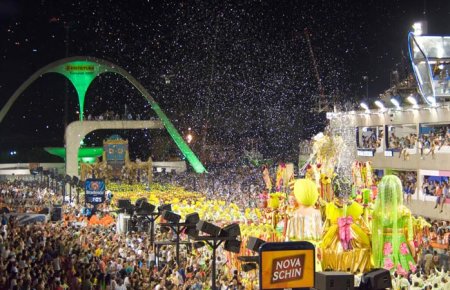
Here are 10 things you should know about Rio de Janeiro:
1. Rio de Janeiro means January River
The word Rio de Janeiro means January River, but the river is actually a bay. It was in January 1502 that Portuguese explorer Gaspar de Lemos first arrived in Rio. Legend has it that Lemos was sailing through Guanabara Bay when he came up with the name for the city, mistaking the bay as the mouth of a big river.
2. Rio has one of the 7 wonders of the world
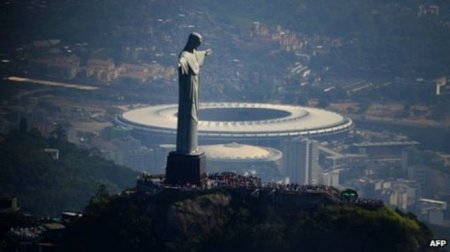
The statue of Christ the Redeemer was elected one of the world’s new seven wonders. Inaugurated in 1931, as a tribute to Rio’s 100th anniversary, the Christ is 98-feet-tall and the largest Art Deco statue in the world.
3. Rio de Janeiro has the world’s bluest sky
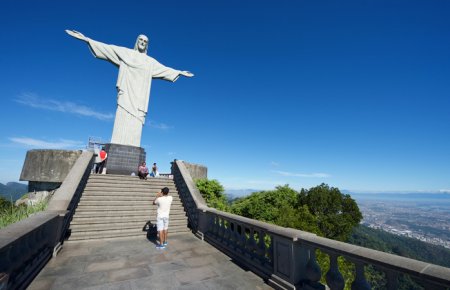
Clear skies, warm sand, a cold drink… Isn’t that what everyone wants for their holiday? Well, in Rio you will not only find that, but also the bluest sky in the whole wide world.
4. Rio’s carnival party is the biggest carnival in the world
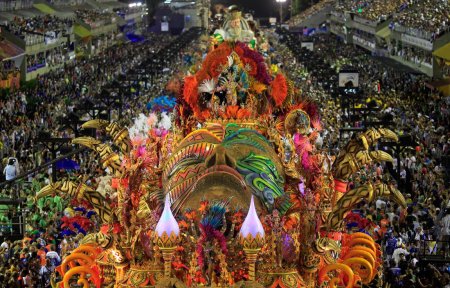
According to the Guinness Book of Records, in 2004 the city’s most illustrious party attracted a record 400,000 foreign visitors, becoming the biggest carnival party in the world.
5. There are more than one hundred islands in Guanabara Bay
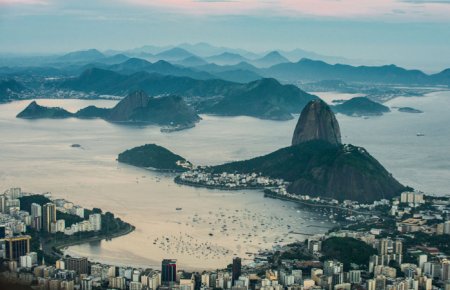
The bay is the second biggest in the country, with its 256 square mile surface, 53 beaches, and more than one hundred islands. You will probably visit at least one of them, the biggest one, in fact. Ilha do Governador, or Governor’s Island, is where the international airport of Rio is located.
6. Rio is home to the eighth biggest library in the world
It was November 1807, and the Royal Family of Portugal had to make a tough decision – To run to Rio de Janeiro, Brazil, to escape Napoleon and his troops. The departure was well organised: about 15,000 people among family members and servants traveled to Brazil in 14 ships. With them, came one of Portugal’s most important riches: the Royal Library and its 60,000 items.
7. People from Rio are among the quickest getting on and off buses
Buses are the most affordable way to get around Rio, and they will take visitors almost anywhere in the city. Riding a bus in Rio isn’t, however, as straight forward an experience as one might hope for. Bus drivers aren’t exactly cautious, trustworthy drivers, and they will often leave passengers behind if they are not quick enough to get on. Like Lagos, Like Rio, right?
8. Rio de Janeiro was almost not the 2016 Summer Olympics host
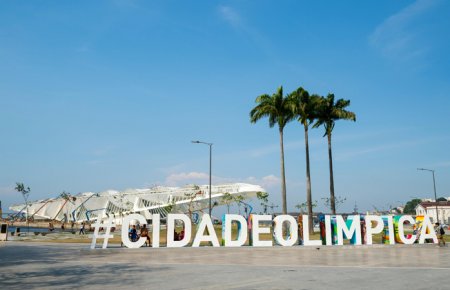
Rio nearly didn’t make the four city short-list the International Olympics Committee selected before the final decision. It had a lower grade than Doha, which ended up discarded because of a technicality (due to the high temperatures in the city during the European summer, Doha had suggested to hold the Olympics in October, but that didn’t stick).
9. Rio was once the only European capital outside Europe
Desperate times require desperate measures, at least that’s what it was like for Dom João VI. It was 1807, and Napoleon’s troops were getting closer and closer to invading Portugal in order to ensure the small coastal country would bow to France’s rule. Dom João VI wanted nothing of the sort, and instead packed his bags and moved the whole kingdom to Rio, between 1808 and 1821, when it was safe for the royals to go back home. After getting a taste of being the headquarters of the Empire, Rio didn’t want to go back to the old ways. Brazil’s independence was declared in 1822.
10. The world’s biggest football match ever was held in Rio
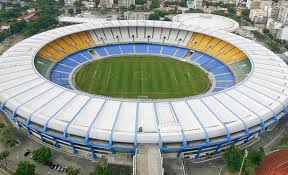
Brazilians don’t remember it fondly, but 16 July 1950 was a historical day. Brazil was playing Uruguay in the final match of the 1950 World Cup. The stage was Maracanã, built especially for the occasion and, at the time, the biggest stadium in the world.
A total of 173,850 paid spectators – and an estimated 20,000 free loaders – were there to see what everyone thought was going to be Brazil’s first time receiving the World Cup. But Uruguay snatched Brazilians’ victory away, and the silence of the dozens of thousands was so loud, they gave it a name: Maracanazo.

Here are 10 things you should know about Rio de Janeiro:
1. Rio de Janeiro means January River
The word Rio de Janeiro means January River, but the river is actually a bay. It was in January 1502 that Portuguese explorer Gaspar de Lemos first arrived in Rio. Legend has it that Lemos was sailing through Guanabara Bay when he came up with the name for the city, mistaking the bay as the mouth of a big river.
2. Rio has one of the 7 wonders of the world

The statue of Christ the Redeemer was elected one of the world’s new seven wonders. Inaugurated in 1931, as a tribute to Rio’s 100th anniversary, the Christ is 98-feet-tall and the largest Art Deco statue in the world.
3. Rio de Janeiro has the world’s bluest sky

Clear skies, warm sand, a cold drink… Isn’t that what everyone wants for their holiday? Well, in Rio you will not only find that, but also the bluest sky in the whole wide world.
4. Rio’s carnival party is the biggest carnival in the world

According to the Guinness Book of Records, in 2004 the city’s most illustrious party attracted a record 400,000 foreign visitors, becoming the biggest carnival party in the world.
5. There are more than one hundred islands in Guanabara Bay

The bay is the second biggest in the country, with its 256 square mile surface, 53 beaches, and more than one hundred islands. You will probably visit at least one of them, the biggest one, in fact. Ilha do Governador, or Governor’s Island, is where the international airport of Rio is located.
6. Rio is home to the eighth biggest library in the world
It was November 1807, and the Royal Family of Portugal had to make a tough decision – To run to Rio de Janeiro, Brazil, to escape Napoleon and his troops. The departure was well organised: about 15,000 people among family members and servants traveled to Brazil in 14 ships. With them, came one of Portugal’s most important riches: the Royal Library and its 60,000 items.
7. People from Rio are among the quickest getting on and off buses
Buses are the most affordable way to get around Rio, and they will take visitors almost anywhere in the city. Riding a bus in Rio isn’t, however, as straight forward an experience as one might hope for. Bus drivers aren’t exactly cautious, trustworthy drivers, and they will often leave passengers behind if they are not quick enough to get on. Like Lagos, Like Rio, right?
8. Rio de Janeiro was almost not the 2016 Summer Olympics host

Rio nearly didn’t make the four city short-list the International Olympics Committee selected before the final decision. It had a lower grade than Doha, which ended up discarded because of a technicality (due to the high temperatures in the city during the European summer, Doha had suggested to hold the Olympics in October, but that didn’t stick).
9. Rio was once the only European capital outside Europe
Desperate times require desperate measures, at least that’s what it was like for Dom João VI. It was 1807, and Napoleon’s troops were getting closer and closer to invading Portugal in order to ensure the small coastal country would bow to France’s rule. Dom João VI wanted nothing of the sort, and instead packed his bags and moved the whole kingdom to Rio, between 1808 and 1821, when it was safe for the royals to go back home. After getting a taste of being the headquarters of the Empire, Rio didn’t want to go back to the old ways. Brazil’s independence was declared in 1822.
10. The world’s biggest football match ever was held in Rio

Brazilians don’t remember it fondly, but 16 July 1950 was a historical day. Brazil was playing Uruguay in the final match of the 1950 World Cup. The stage was Maracanã, built especially for the occasion and, at the time, the biggest stadium in the world.
A total of 173,850 paid spectators – and an estimated 20,000 free loaders – were there to see what everyone thought was going to be Brazil’s first time receiving the World Cup. But Uruguay snatched Brazilians’ victory away, and the silence of the dozens of thousands was so loud, they gave it a name: Maracanazo.

